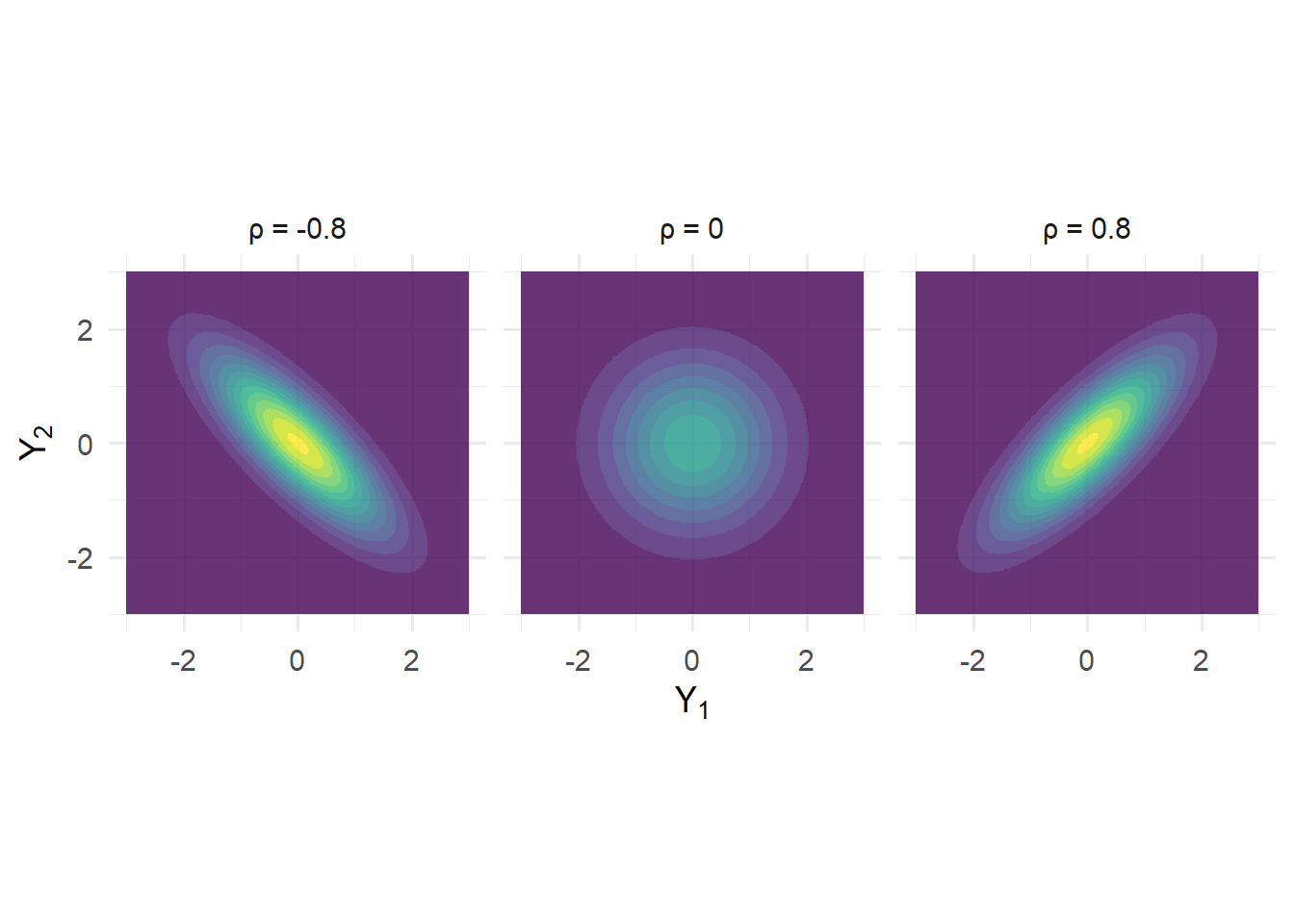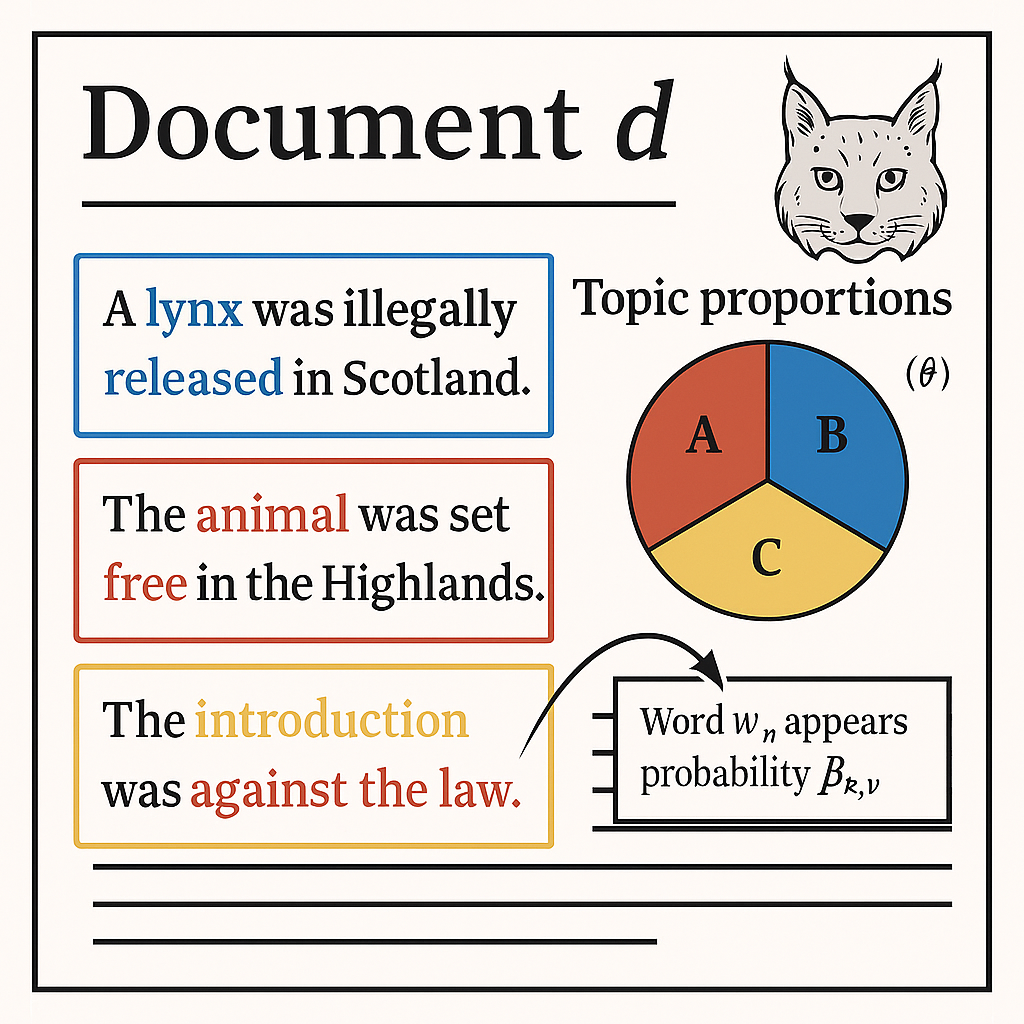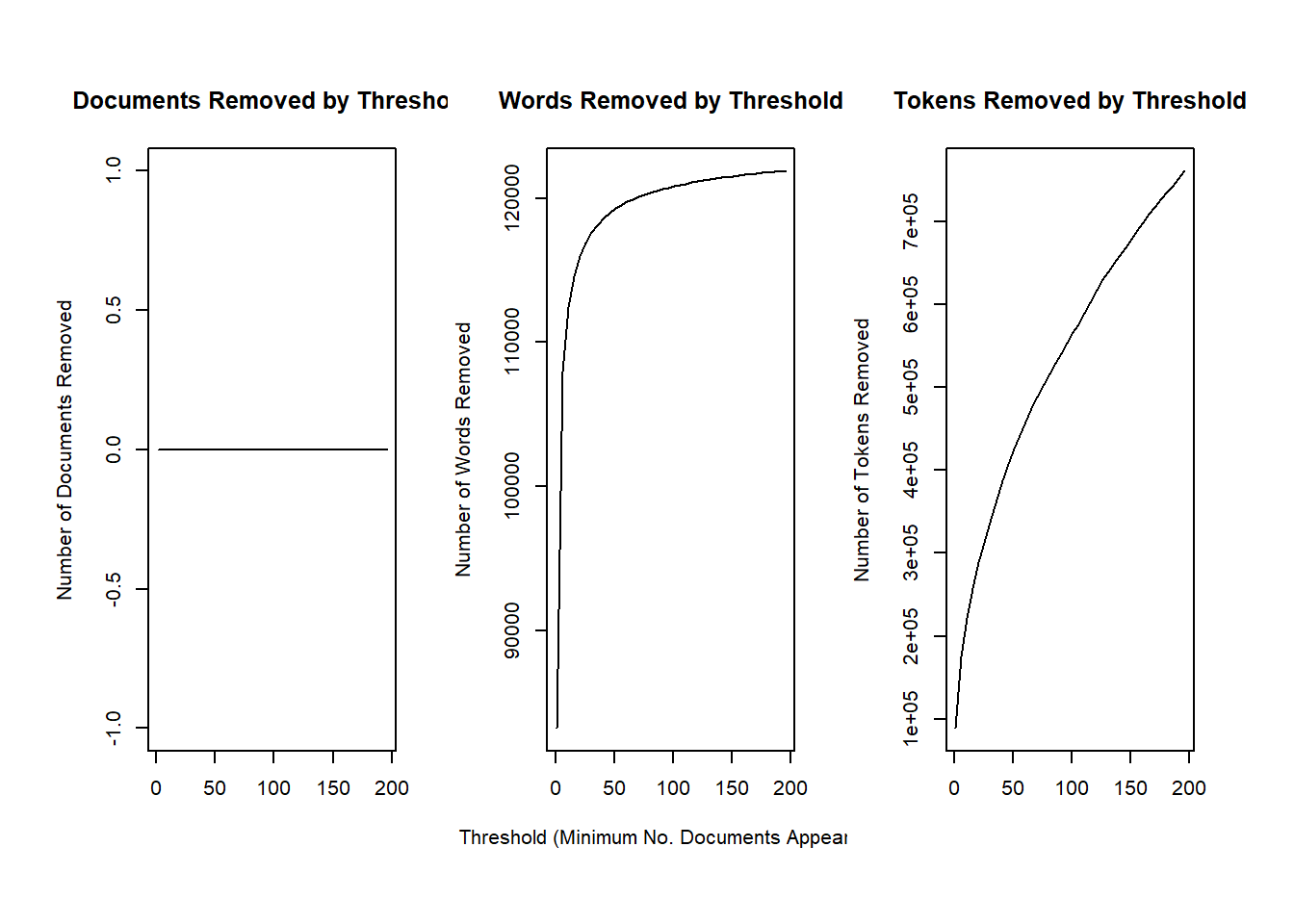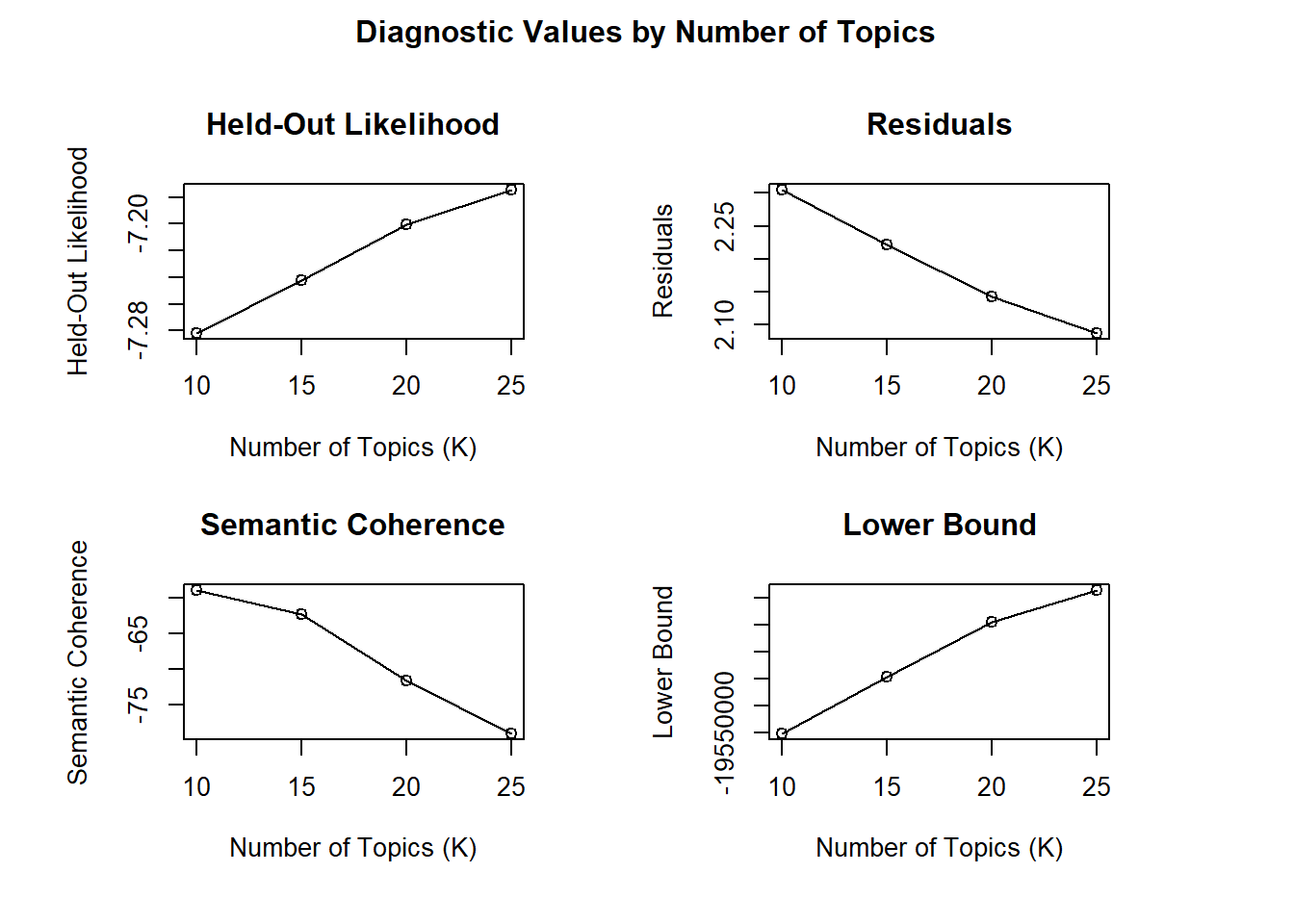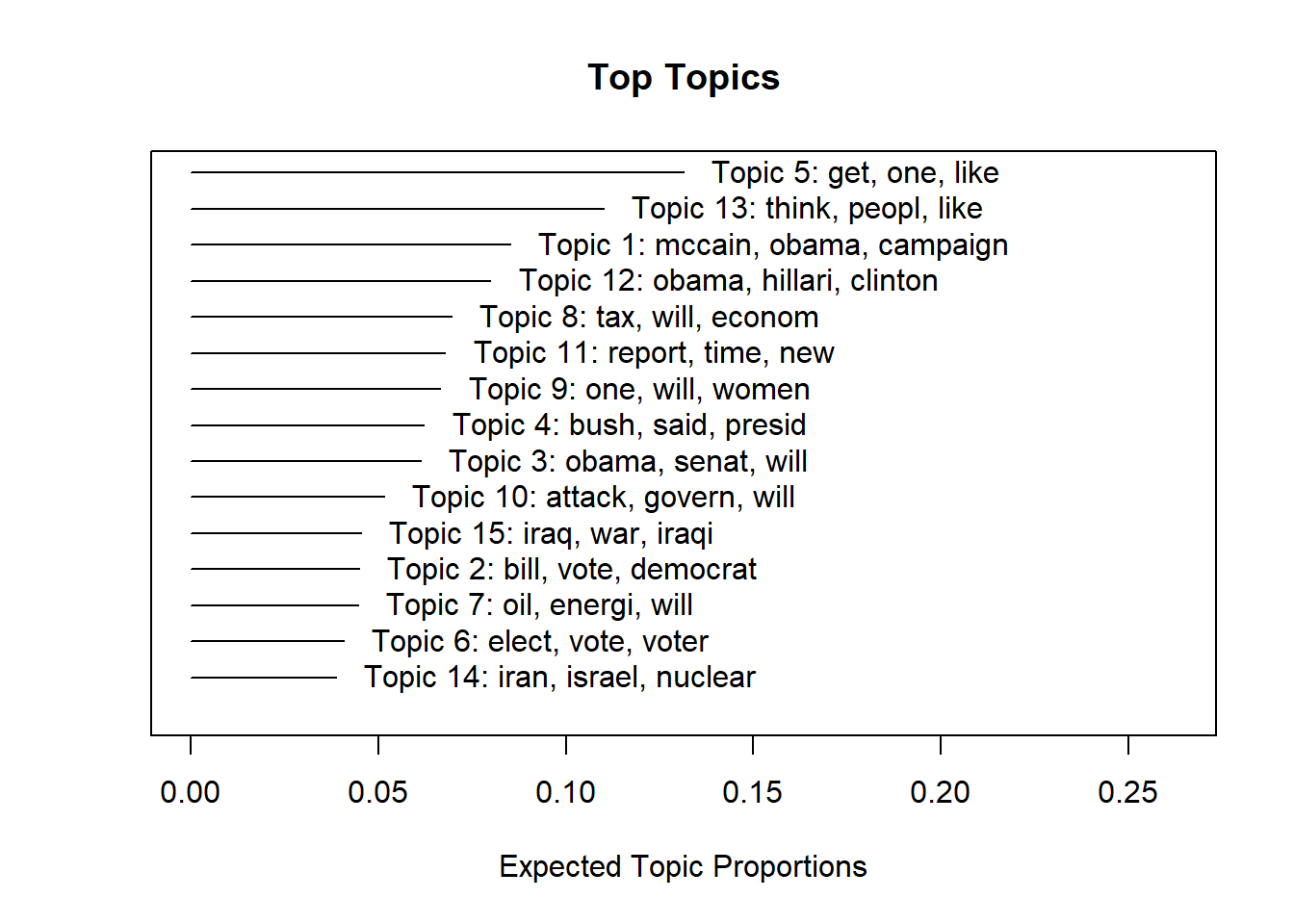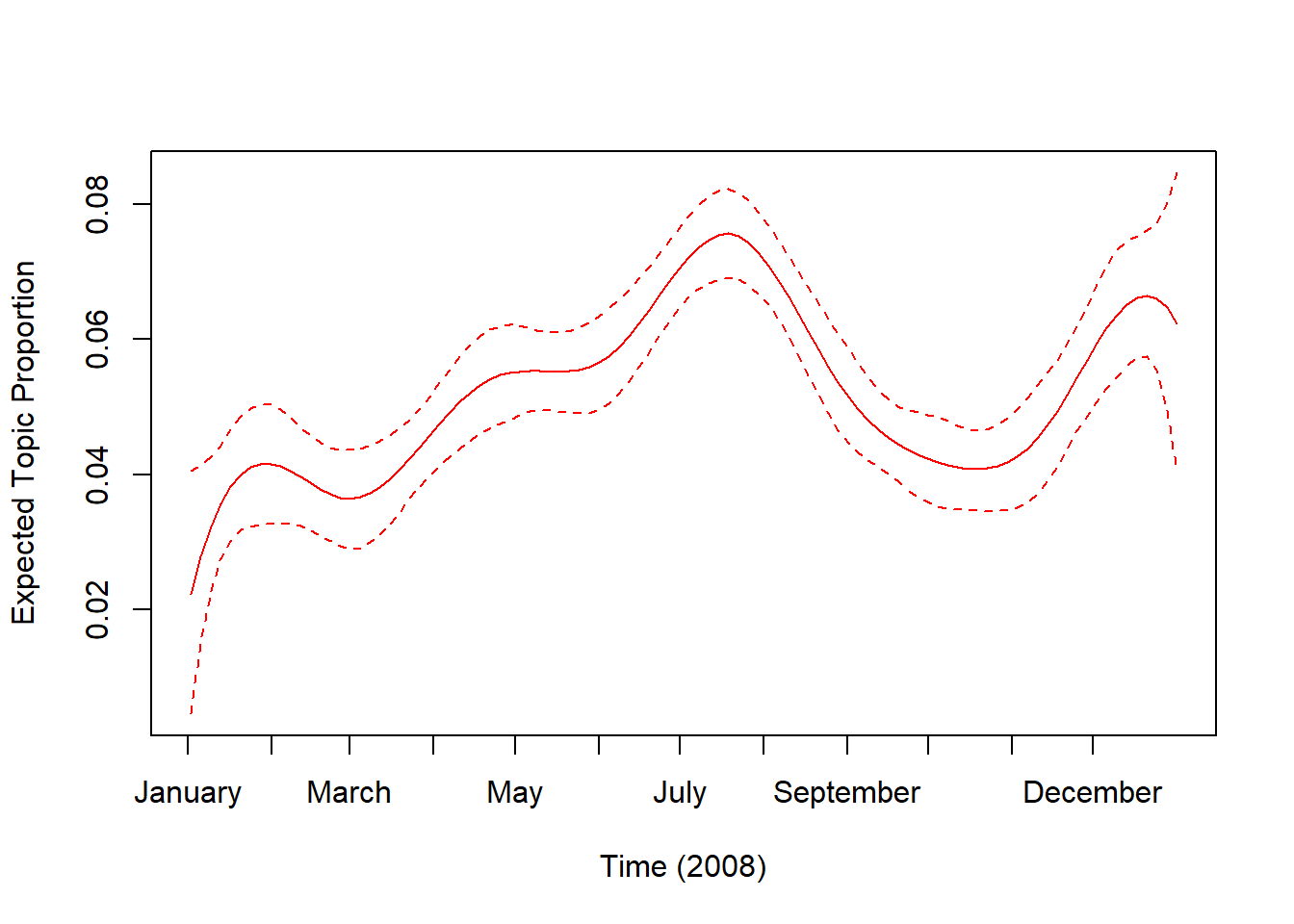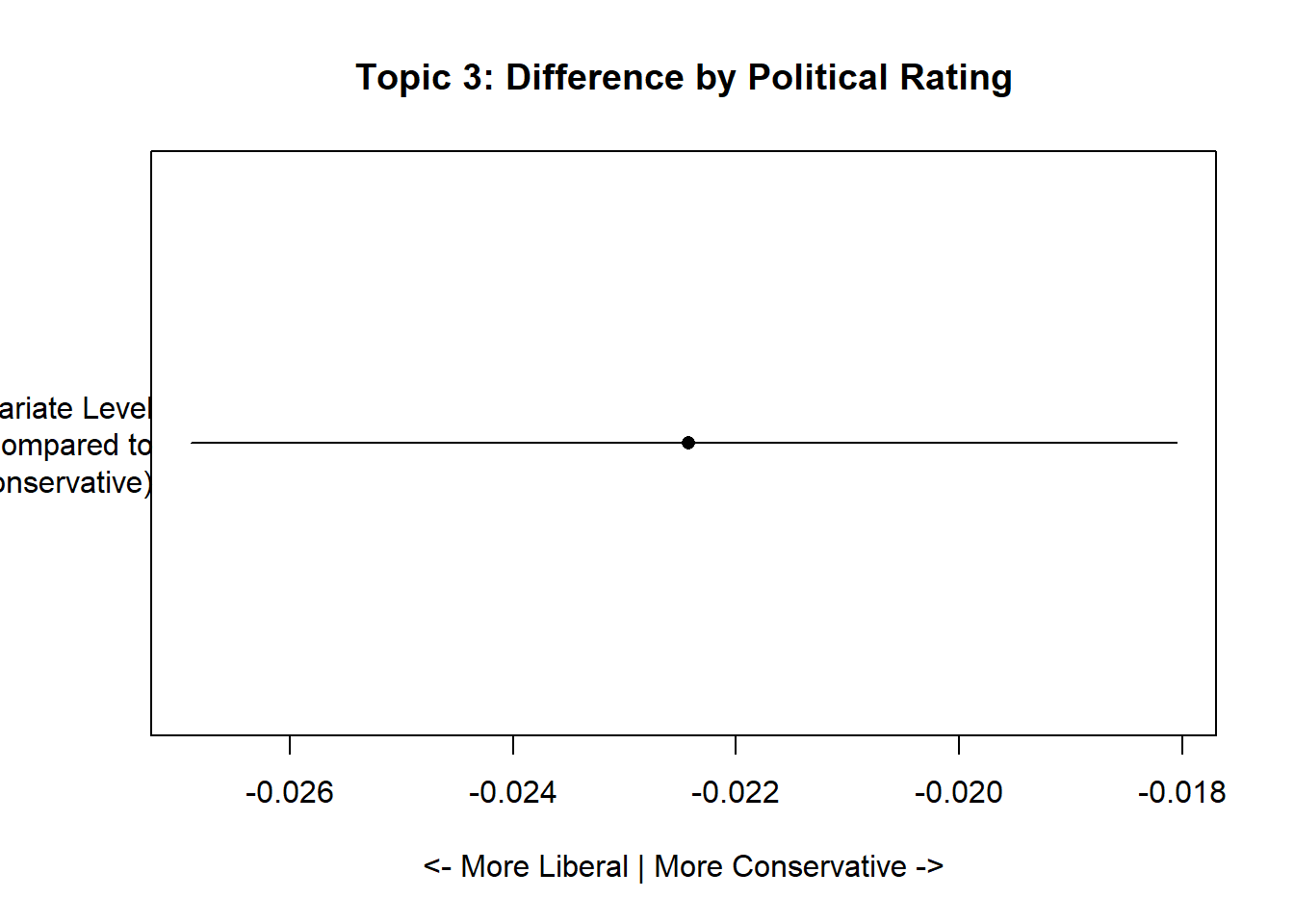Beginning Spectral Initialization
Calculating the gram matrix...
Finding anchor words...
..........
Recovering initialization...
...............................................
Initialization complete.
....................................................................................................
Completed E-Step (4 seconds).
Completed M-Step.
Completing Iteration 1 (approx. per word bound = -7.455)
....................................................................................................
Completed E-Step (4 seconds).
Completed M-Step.
Completing Iteration 2 (approx. per word bound = -7.352, relative change = 1.390e-02)
....................................................................................................
Completed E-Step (4 seconds).
Completed M-Step.
Completing Iteration 3 (approx. per word bound = -7.320, relative change = 4.261e-03)
....................................................................................................
Completed E-Step (3 seconds).
Completed M-Step.
Completing Iteration 4 (approx. per word bound = -7.307, relative change = 1.754e-03)
....................................................................................................
Completed E-Step (3 seconds).
Completed M-Step.
Completing Iteration 5 (approx. per word bound = -7.301, relative change = 8.952e-04)
Topic 1: obama, mccain, campaign, hillari, barack
Topic 2: bill, legisl, hous, congress, senat
Topic 3: bush, said, presid, report, administr
Topic 4: democrat, obama, senat, republican, will
Topic 5: one, like, get, just, time
Topic 6: will, govern, year, can, new
Topic 7: mccain, tax, john, said, will
Topic 8: vote, state, elect, voter, democrat
Topic 9: iraq, will, war, iran, militari
Topic 10: peopl, one, will, american, right
....................................................................................................
Completed E-Step (3 seconds).
Completed M-Step.
Completing Iteration 6 (approx. per word bound = -7.297, relative change = 5.289e-04)
....................................................................................................
Completed E-Step (3 seconds).
Completed M-Step.
Completing Iteration 7 (approx. per word bound = -7.294, relative change = 3.437e-04)
....................................................................................................
Completed E-Step (3 seconds).
Completed M-Step.
Completing Iteration 8 (approx. per word bound = -7.293, relative change = 2.434e-04)
....................................................................................................
Completed E-Step (3 seconds).
Completed M-Step.
Completing Iteration 9 (approx. per word bound = -7.291, relative change = 1.829e-04)
....................................................................................................
Completed E-Step (3 seconds).
Completed M-Step.
Completing Iteration 10 (approx. per word bound = -7.290, relative change = 1.440e-04)
Topic 1: obama, mccain, campaign, hillari, barack
Topic 2: bill, hous, legisl, congress, fund
Topic 3: bush, said, report, presid, administr
Topic 4: democrat, republican, senat, obama, will
Topic 5: one, like, get, just, time
Topic 6: will, oil, govern, year, energi
Topic 7: mccain, tax, john, palin, said
Topic 8: vote, state, voter, elect, poll
Topic 9: iraq, war, will, militari, iran
Topic 10: peopl, one, american, will, right
....................................................................................................
Completed E-Step (3 seconds).
Completed M-Step.
Completing Iteration 11 (approx. per word bound = -7.289, relative change = 1.179e-04)
....................................................................................................
Completed E-Step (3 seconds).
Completed M-Step.
Completing Iteration 12 (approx. per word bound = -7.289, relative change = 9.910e-05)
....................................................................................................
Completed E-Step (3 seconds).
Completed M-Step.
Completing Iteration 13 (approx. per word bound = -7.288, relative change = 8.634e-05)
....................................................................................................
Completed E-Step (3 seconds).
Completed M-Step.
Completing Iteration 14 (approx. per word bound = -7.288, relative change = 7.801e-05)
....................................................................................................
Completed E-Step (3 seconds).
Completed M-Step.
Completing Iteration 15 (approx. per word bound = -7.287, relative change = 7.245e-05)
Topic 1: obama, mccain, campaign, barack, hillari
Topic 2: bill, hous, legisl, congress, fund
Topic 3: bush, said, report, presid, administr
Topic 4: democrat, republican, senat, will, polit
Topic 5: one, like, get, time, just
Topic 6: will, oil, year, govern, energi
Topic 7: mccain, palin, john, tax, said
Topic 8: vote, state, poll, voter, elect
Topic 9: iraq, war, will, militari, iran
Topic 10: peopl, one, american, will, right
....................................................................................................
Completed E-Step (3 seconds).
Completed M-Step.
Completing Iteration 16 (approx. per word bound = -7.287, relative change = 6.814e-05)
....................................................................................................
Completed E-Step (3 seconds).
Completed M-Step.
Completing Iteration 17 (approx. per word bound = -7.286, relative change = 6.421e-05)
....................................................................................................
Completed E-Step (3 seconds).
Completed M-Step.
Completing Iteration 18 (approx. per word bound = -7.286, relative change = 6.101e-05)
....................................................................................................
Completed E-Step (3 seconds).
Completed M-Step.
Completing Iteration 19 (approx. per word bound = -7.285, relative change = 5.867e-05)
....................................................................................................
Completed E-Step (3 seconds).
Completed M-Step.
Completing Iteration 20 (approx. per word bound = -7.285, relative change = 5.722e-05)
Topic 1: obama, campaign, mccain, barack, hillari
Topic 2: bill, hous, legisl, congress, money
Topic 3: bush, said, report, presid, administr
Topic 4: democrat, republican, will, senat, polit
Topic 5: one, like, get, time, just
Topic 6: will, oil, year, govern, new
Topic 7: mccain, palin, john, tax, said
Topic 8: vote, state, poll, voter, democrat
Topic 9: iraq, war, will, militari, iran
Topic 10: peopl, american, one, will, right
....................................................................................................
Completed E-Step (3 seconds).
Completed M-Step.
Completing Iteration 21 (approx. per word bound = -7.284, relative change = 5.625e-05)
....................................................................................................
Completed E-Step (3 seconds).
Completed M-Step.
Completing Iteration 22 (approx. per word bound = -7.284, relative change = 5.558e-05)
....................................................................................................
Completed E-Step (3 seconds).
Completed M-Step.
Completing Iteration 23 (approx. per word bound = -7.284, relative change = 5.505e-05)
....................................................................................................
Completed E-Step (3 seconds).
Completed M-Step.
Completing Iteration 24 (approx. per word bound = -7.283, relative change = 5.459e-05)
....................................................................................................
Completed E-Step (3 seconds).
Completed M-Step.
Completing Iteration 25 (approx. per word bound = -7.283, relative change = 5.381e-05)
Topic 1: obama, campaign, barack, mccain, hillari
Topic 2: hous, bill, legisl, congress, money
Topic 3: bush, said, report, presid, administr
Topic 4: democrat, will, republican, think, presid
Topic 5: one, like, get, time, just
Topic 6: will, oil, year, econom, govern
Topic 7: mccain, palin, john, said, sen
Topic 8: vote, state, poll, voter, democrat
Topic 9: iraq, war, will, militari, iran
Topic 10: peopl, american, one, will, america
....................................................................................................
Completed E-Step (3 seconds).
Completed M-Step.
Completing Iteration 26 (approx. per word bound = -7.282, relative change = 5.239e-05)
....................................................................................................
Completed E-Step (3 seconds).
Completed M-Step.
Completing Iteration 27 (approx. per word bound = -7.282, relative change = 5.009e-05)
....................................................................................................
Completed E-Step (3 seconds).
Completed M-Step.
Completing Iteration 28 (approx. per word bound = -7.282, relative change = 4.722e-05)
....................................................................................................
Completed E-Step (3 seconds).
Completed M-Step.
Completing Iteration 29 (approx. per word bound = -7.281, relative change = 4.415e-05)
....................................................................................................
Completed E-Step (3 seconds).
Completed M-Step.
Completing Iteration 30 (approx. per word bound = -7.281, relative change = 4.086e-05)
Topic 1: obama, campaign, barack, hillari, clinton
Topic 2: hous, bill, legisl, senat, congress
Topic 3: bush, said, report, administr, presid
Topic 4: democrat, will, think, republican, presid
Topic 5: one, like, get, time, media
Topic 6: will, tax, year, oil, econom
Topic 7: mccain, john, palin, said, sen
Topic 8: vote, state, democrat, poll, voter
Topic 9: iraq, war, will, militari, iran
Topic 10: peopl, american, one, will, america
....................................................................................................
Completed E-Step (3 seconds).
Completed M-Step.
Completing Iteration 31 (approx. per word bound = -7.281, relative change = 3.714e-05)
....................................................................................................
Completed E-Step (3 seconds).
Completed M-Step.
Completing Iteration 32 (approx. per word bound = -7.281, relative change = 3.300e-05)
....................................................................................................
Completed E-Step (3 seconds).
Completed M-Step.
Completing Iteration 33 (approx. per word bound = -7.280, relative change = 2.842e-05)
....................................................................................................
Completed E-Step (3 seconds).
Completed M-Step.
Completing Iteration 34 (approx. per word bound = -7.280, relative change = 2.430e-05)
....................................................................................................
Completed E-Step (3 seconds).
Completed M-Step.
Completing Iteration 35 (approx. per word bound = -7.280, relative change = 2.064e-05)
Topic 1: obama, campaign, barack, hillari, clinton
Topic 2: hous, bill, senat, legisl, congress
Topic 3: bush, said, report, administr, presid
Topic 4: think, will, peopl, democrat, presid
Topic 5: one, like, get, time, media
Topic 6: will, tax, american, year, econom
Topic 7: mccain, john, palin, said, sen
Topic 8: vote, democrat, state, poll, voter
Topic 9: iraq, war, will, militari, iran
Topic 10: peopl, american, one, will, america
....................................................................................................
Completed E-Step (3 seconds).
Completed M-Step.
Completing Iteration 36 (approx. per word bound = -7.280, relative change = 1.772e-05)
....................................................................................................
Completed E-Step (3 seconds).
Completed M-Step.
Completing Iteration 37 (approx. per word bound = -7.280, relative change = 1.543e-05)
....................................................................................................
Completed E-Step (3 seconds).
Completed M-Step.
Completing Iteration 38 (approx. per word bound = -7.280, relative change = 1.364e-05)
....................................................................................................
Completed E-Step (3 seconds).
Completed M-Step.
Completing Iteration 39 (approx. per word bound = -7.280, relative change = 1.194e-05)
....................................................................................................
Completed E-Step (3 seconds).
Completed M-Step.
Completing Iteration 40 (approx. per word bound = -7.279, relative change = 1.056e-05)
Topic 1: obama, campaign, barack, hillari, clinton
Topic 2: hous, bill, senat, legisl, congress
Topic 3: bush, said, report, administr, presid
Topic 4: think, peopl, will, like, presid
Topic 5: one, like, get, time, media
Topic 6: will, tax, american, econom, year
Topic 7: mccain, john, palin, said, sen
Topic 8: vote, democrat, state, poll, voter
Topic 9: iraq, war, will, militari, iran
Topic 10: peopl, american, one, will, america
....................................................................................................
Completed E-Step (3 seconds).
Completed M-Step.
Model Converged
Beginning Spectral Initialization
Calculating the gram matrix...
Finding anchor words...
...............
Recovering initialization...
...............................................
Initialization complete.
....................................................................................................
Completed E-Step (5 seconds).
Completed M-Step.
Completing Iteration 1 (approx. per word bound = -7.421)
....................................................................................................
Completed E-Step (5 seconds).
Completed M-Step.
Completing Iteration 2 (approx. per word bound = -7.311, relative change = 1.471e-02)
....................................................................................................
Completed E-Step (5 seconds).
Completed M-Step.
Completing Iteration 3 (approx. per word bound = -7.280, relative change = 4.276e-03)
....................................................................................................
Completed E-Step (5 seconds).
Completed M-Step.
Completing Iteration 4 (approx. per word bound = -7.266, relative change = 1.897e-03)
....................................................................................................
Completed E-Step (4 seconds).
Completed M-Step.
Completing Iteration 5 (approx. per word bound = -7.259, relative change = 1.026e-03)
Topic 1: obama, mccain, campaign, barack, john
Topic 2: bill, legisl, vote, congress, hous
Topic 3: bush, presid, said, report, hous
Topic 4: democrat, senat, republican, obama, will
Topic 5: get, one, like, ’re, ’ll
Topic 6: will, govern, can, peopl, american
Topic 7: tax, mccain, economi, will, econom
Topic 8: vote, elect, state, voter, court
Topic 9: will, oil, attack, russia, govern
Topic 10: one, will, peopl, like, can
Topic 11: school, citi, said, report, polic
Topic 12: palin, think, say, like, mccain
Topic 13: obama, hillari, clinton, mccain, democrat
Topic 14: iran, israel, bush, presid, nuclear
Topic 15: iraq, iraqi, war, troop, militari
....................................................................................................
Completed E-Step (4 seconds).
Completed M-Step.
Completing Iteration 6 (approx. per word bound = -7.254, relative change = 6.118e-04)
....................................................................................................
Completed E-Step (4 seconds).
Completed M-Step.
Completing Iteration 7 (approx. per word bound = -7.252, relative change = 3.915e-04)
....................................................................................................
Completed E-Step (4 seconds).
Completed M-Step.
Completing Iteration 8 (approx. per word bound = -7.250, relative change = 2.670e-04)
....................................................................................................
Completed E-Step (4 seconds).
Completed M-Step.
Completing Iteration 9 (approx. per word bound = -7.248, relative change = 1.936e-04)
....................................................................................................
Completed E-Step (4 seconds).
Completed M-Step.
Completing Iteration 10 (approx. per word bound = -7.247, relative change = 1.485e-04)
Topic 1: obama, mccain, campaign, barack, john
Topic 2: bill, vote, legisl, congress, senat
Topic 3: bush, presid, said, administr, report
Topic 4: democrat, republican, senat, parti, will
Topic 5: get, one, ’re, like, don’t
Topic 6: will, govern, can, need, american
Topic 7: tax, economi, econom, plan, health
Topic 8: vote, elect, state, voter, court
Topic 9: will, attack, govern, russia, pakistan
Topic 10: one, will, peopl, world, time
Topic 11: school, citi, report, offic, state
Topic 12: think, peopl, like, say, know
Topic 13: obama, hillari, clinton, poll, democrat
Topic 14: iran, israel, nuclear, bush, state
Topic 15: iraq, war, iraqi, troop, militari
....................................................................................................
Completed E-Step (4 seconds).
Completed M-Step.
Completing Iteration 11 (approx. per word bound = -7.246, relative change = 1.196e-04)
....................................................................................................
Completed E-Step (4 seconds).
Completed M-Step.
Completing Iteration 12 (approx. per word bound = -7.246, relative change = 1.009e-04)
....................................................................................................
Completed E-Step (4 seconds).
Completed M-Step.
Completing Iteration 13 (approx. per word bound = -7.245, relative change = 8.767e-05)
....................................................................................................
Completed E-Step (4 seconds).
Completed M-Step.
Completing Iteration 14 (approx. per word bound = -7.244, relative change = 7.691e-05)
....................................................................................................
Completed E-Step (4 seconds).
Completed M-Step.
Completing Iteration 15 (approx. per word bound = -7.244, relative change = 6.649e-05)
Topic 1: obama, mccain, campaign, barack, john
Topic 2: bill, vote, congress, legisl, senat
Topic 3: bush, presid, said, administr, report
Topic 4: democrat, republican, senat, parti, will
Topic 5: get, one, like, ’re, don’t
Topic 6: will, can, govern, american, need
Topic 7: tax, econom, plan, economi, financi
Topic 8: vote, elect, state, voter, campaign
Topic 9: attack, govern, will, russia, pakistan
Topic 10: one, will, life, peopl, world
Topic 11: school, report, citi, group, new
Topic 12: think, peopl, like, say, know
Topic 13: obama, hillari, clinton, poll, democrat
Topic 14: iran, israel, nuclear, state, presid
Topic 15: iraq, war, iraqi, militari, troop
....................................................................................................
Completed E-Step (4 seconds).
Completed M-Step.
Completing Iteration 16 (approx. per word bound = -7.243, relative change = 5.662e-05)
....................................................................................................
Completed E-Step (4 seconds).
Completed M-Step.
Completing Iteration 17 (approx. per word bound = -7.243, relative change = 4.779e-05)
....................................................................................................
Completed E-Step (4 seconds).
Completed M-Step.
Completing Iteration 18 (approx. per word bound = -7.243, relative change = 4.055e-05)
....................................................................................................
Completed E-Step (4 seconds).
Completed M-Step.
Completing Iteration 19 (approx. per word bound = -7.243, relative change = 3.469e-05)
....................................................................................................
Completed E-Step (4 seconds).
Completed M-Step.
Completing Iteration 20 (approx. per word bound = -7.242, relative change = 3.029e-05)
Topic 1: obama, mccain, campaign, john, barack
Topic 2: bill, vote, congress, legisl, senat
Topic 3: bush, presid, said, administr, report
Topic 4: democrat, republican, senat, parti, will
Topic 5: get, one, like, ’re, don’t
Topic 6: will, can, american, need, make
Topic 7: tax, econom, plan, economi, financi
Topic 8: vote, elect, voter, state, campaign
Topic 9: attack, govern, will, russia, terrorist
Topic 10: one, will, life, world, time
Topic 11: school, report, group, citi, new
Topic 12: think, peopl, like, dont, know
Topic 13: obama, hillari, clinton, poll, democrat
Topic 14: iran, israel, nuclear, state, terrorist
Topic 15: iraq, war, iraqi, militari, troop
....................................................................................................
Completed E-Step (4 seconds).
Completed M-Step.
Completing Iteration 21 (approx. per word bound = -7.242, relative change = 2.703e-05)
....................................................................................................
Completed E-Step (4 seconds).
Completed M-Step.
Completing Iteration 22 (approx. per word bound = -7.242, relative change = 2.446e-05)
....................................................................................................
Completed E-Step (4 seconds).
Completed M-Step.
Completing Iteration 23 (approx. per word bound = -7.242, relative change = 2.274e-05)
....................................................................................................
Completed E-Step (4 seconds).
Completed M-Step.
Completing Iteration 24 (approx. per word bound = -7.242, relative change = 2.077e-05)
....................................................................................................
Completed E-Step (4 seconds).
Completed M-Step.
Completing Iteration 25 (approx. per word bound = -7.241, relative change = 1.961e-05)
Topic 1: obama, mccain, campaign, john, barack
Topic 2: bill, vote, congress, legisl, senat
Topic 3: bush, presid, said, administr, hous
Topic 4: democrat, republican, senat, parti, obama
Topic 5: get, one, like, ’re, don’t
Topic 6: will, american, can, need, chang
Topic 7: tax, econom, plan, money, million
Topic 8: vote, elect, voter, state, campaign
Topic 9: attack, govern, will, terrorist, russia
Topic 10: one, will, life, world, day
Topic 11: report, school, new, group, citi
Topic 12: think, peopl, like, dont, say
Topic 13: obama, hillari, clinton, poll, democrat
Topic 14: iran, israel, nuclear, state, foreign
Topic 15: iraq, war, iraqi, militari, troop
....................................................................................................
Completed E-Step (4 seconds).
Completed M-Step.
Completing Iteration 26 (approx. per word bound = -7.241, relative change = 1.764e-05)
....................................................................................................
Completed E-Step (4 seconds).
Completed M-Step.
Completing Iteration 27 (approx. per word bound = -7.241, relative change = 1.613e-05)
....................................................................................................
Completed E-Step (4 seconds).
Completed M-Step.
Completing Iteration 28 (approx. per word bound = -7.241, relative change = 1.512e-05)
....................................................................................................
Completed E-Step (4 seconds).
Completed M-Step.
Completing Iteration 29 (approx. per word bound = -7.241, relative change = 1.455e-05)
....................................................................................................
Completed E-Step (4 seconds).
Completed M-Step.
Completing Iteration 30 (approx. per word bound = -7.241, relative change = 1.373e-05)
Topic 1: obama, mccain, campaign, john, barack
Topic 2: bill, vote, congress, senat, legisl
Topic 3: bush, presid, said, administr, hous
Topic 4: democrat, republican, senat, obama, parti
Topic 5: get, one, like, ’re, don’t
Topic 6: will, american, can, need, chang
Topic 7: tax, econom, money, plan, million
Topic 8: vote, elect, voter, state, campaign
Topic 9: govern, attack, will, terrorist, forc
Topic 10: one, will, life, world, day
Topic 11: report, new, school, group, time
Topic 12: think, peopl, like, dont, say
Topic 13: obama, hillari, clinton, democrat, poll
Topic 14: iran, israel, nuclear, state, foreign
Topic 15: iraq, war, iraqi, militari, troop
....................................................................................................
Completed E-Step (4 seconds).
Completed M-Step.
Completing Iteration 31 (approx. per word bound = -7.241, relative change = 1.290e-05)
....................................................................................................
Completed E-Step (4 seconds).
Completed M-Step.
Completing Iteration 32 (approx. per word bound = -7.241, relative change = 1.194e-05)
....................................................................................................
Completed E-Step (4 seconds).
Completed M-Step.
Completing Iteration 33 (approx. per word bound = -7.241, relative change = 1.130e-05)
....................................................................................................
Completed E-Step (4 seconds).
Completed M-Step.
Completing Iteration 34 (approx. per word bound = -7.241, relative change = 1.094e-05)
....................................................................................................
Completed E-Step (4 seconds).
Completed M-Step.
Completing Iteration 35 (approx. per word bound = -7.241, relative change = 1.049e-05)
Topic 1: obama, mccain, campaign, john, barack
Topic 2: bill, vote, congress, senat, legisl
Topic 3: bush, presid, said, administr, hous
Topic 4: democrat, obama, republican, senat, parti
Topic 5: get, one, like, ’re, don’t
Topic 6: will, american, can, need, oil
Topic 7: tax, money, econom, plan, million
Topic 8: vote, elect, voter, state, campaign
Topic 9: govern, attack, will, terrorist, forc
Topic 10: one, will, life, day, world
Topic 11: report, new, school, group, time
Topic 12: think, peopl, like, dont, polit
Topic 13: obama, hillari, clinton, democrat, poll
Topic 14: iran, israel, nuclear, state, foreign
Topic 15: iraq, war, iraqi, militari, troop
....................................................................................................
Completed E-Step (4 seconds).
Completed M-Step.
Completing Iteration 36 (approx. per word bound = -7.240, relative change = 1.036e-05)
....................................................................................................
Completed E-Step (4 seconds).
Completed M-Step.
Completing Iteration 37 (approx. per word bound = -7.240, relative change = 1.023e-05)
....................................................................................................
Completed E-Step (4 seconds).
Completed M-Step.
Completing Iteration 38 (approx. per word bound = -7.240, relative change = 1.009e-05)
....................................................................................................
Completed E-Step (4 seconds).
Completed M-Step.
Completing Iteration 39 (approx. per word bound = -7.240, relative change = 1.004e-05)
....................................................................................................
Completed E-Step (4 seconds).
Completed M-Step.
Model Converged
Beginning Spectral Initialization
Calculating the gram matrix...
Finding anchor words...
....................
Recovering initialization...
...............................................
Initialization complete.
....................................................................................................
Completed E-Step (7 seconds).
Completed M-Step.
Completing Iteration 1 (approx. per word bound = -7.387)
....................................................................................................
Completed E-Step (7 seconds).
Completed M-Step.
Completing Iteration 2 (approx. per word bound = -7.282, relative change = 1.430e-02)
....................................................................................................
Completed E-Step (6 seconds).
Completed M-Step.
Completing Iteration 3 (approx. per word bound = -7.251, relative change = 4.283e-03)
....................................................................................................
Completed E-Step (6 seconds).
Completed M-Step.
Completing Iteration 4 (approx. per word bound = -7.236, relative change = 1.977e-03)
....................................................................................................
Completed E-Step (6 seconds).
Completed M-Step.
Completing Iteration 5 (approx. per word bound = -7.228, relative change = 1.108e-03)
Topic 1: obama, mccain, campaign, barack, john
Topic 2: bill, legisl, congress, vote, hous
Topic 3: bush, presid, hous, white, administr
Topic 4: senat, democrat, republican, will, obama
Topic 5: get, one, ’re, like, ’ll
Topic 6: will, govern, market, peopl, money
Topic 7: mccain, tax, econom, economi, health
Topic 8: vote, elect, voter, state, ballot
Topic 9: russia, world, georgia, nation, will
Topic 10: one, will, peopl, like, can
Topic 11: school, citi, said, polic, immigr
Topic 12: mccain, think, like, say, peopl
Topic 13: obama, mccain, poll, voter, state
Topic 14: iran, israel, nuclear, presid, state
Topic 15: iraq, war, iraqi, troop, militari
Topic 16: court, law, right, tortur, will
Topic 17: hillari, clinton, obama, democrat, will
Topic 18: palin, report, news, media, time
Topic 19: ayer, terrorist, obama, radic, american
Topic 20: will, oil, energi, american, year
....................................................................................................
Completed E-Step (6 seconds).
Completed M-Step.
Completing Iteration 6 (approx. per word bound = -7.223, relative change = 7.021e-04)
....................................................................................................
Completed E-Step (5 seconds).
Completed M-Step.
Completing Iteration 7 (approx. per word bound = -7.220, relative change = 4.784e-04)
....................................................................................................
Completed E-Step (5 seconds).
Completed M-Step.
Completing Iteration 8 (approx. per word bound = -7.217, relative change = 3.386e-04)
....................................................................................................
Completed E-Step (5 seconds).
Completed M-Step.
Completing Iteration 9 (approx. per word bound = -7.215, relative change = 2.497e-04)
....................................................................................................
Completed E-Step (5 seconds).
Completed M-Step.
Completing Iteration 10 (approx. per word bound = -7.214, relative change = 1.897e-04)
Topic 1: obama, mccain, campaign, barack, john
Topic 2: bill, legisl, vote, congress, hous
Topic 3: bush, presid, administr, said, hous
Topic 4: democrat, senat, republican, will, parti
Topic 5: get, one, ’re, like, don’t
Topic 6: will, govern, money, market, financi
Topic 7: tax, mccain, health, econom, economi
Topic 8: vote, elect, voter, state, campaign
Topic 9: world, nation, russia, will, georgia
Topic 10: one, will, peopl, life, like
Topic 11: school, citi, said, immigr, polic
Topic 12: think, peopl, like, dont, polit
Topic 13: mccain, poll, obama, state, voter
Topic 14: iran, israel, nuclear, state, iranian
Topic 15: iraq, war, iraqi, troop, militari
Topic 16: court, law, right, tortur, constitut
Topic 17: clinton, hillari, obama, will, democrat
Topic 18: palin, report, news, media, time
Topic 19: obama, ayer, terrorist, group, chicago
Topic 20: will, oil, energi, american, global
....................................................................................................
Completed E-Step (5 seconds).
Completed M-Step.
Completing Iteration 11 (approx. per word bound = -7.213, relative change = 1.482e-04)
....................................................................................................
Completed E-Step (5 seconds).
Completed M-Step.
Completing Iteration 12 (approx. per word bound = -7.212, relative change = 1.188e-04)
....................................................................................................
Completed E-Step (5 seconds).
Completed M-Step.
Completing Iteration 13 (approx. per word bound = -7.211, relative change = 9.782e-05)
....................................................................................................
Completed E-Step (5 seconds).
Completed M-Step.
Completing Iteration 14 (approx. per word bound = -7.211, relative change = 8.371e-05)
....................................................................................................
Completed E-Step (5 seconds).
Completed M-Step.
Completing Iteration 15 (approx. per word bound = -7.210, relative change = 7.503e-05)
Topic 1: obama, mccain, campaign, barack, john
Topic 2: bill, vote, legisl, congress, hous
Topic 3: bush, presid, said, administr, hous
Topic 4: democrat, republican, senat, will, parti
Topic 5: get, one, ’re, like, don’t
Topic 6: will, govern, money, financi, market
Topic 7: tax, health, econom, economi, care
Topic 8: vote, elect, voter, campaign, state
Topic 9: world, nation, will, russia, georgia
Topic 10: one, will, women, life, peopl
Topic 11: school, citi, said, offic, immigr
Topic 12: think, peopl, like, dont, know
Topic 13: poll, mccain, obama, state, voter
Topic 14: iran, israel, nuclear, iranian, state
Topic 15: iraq, war, iraqi, militari, troop
Topic 16: law, court, right, tortur, state
Topic 17: clinton, hillari, obama, will, democrat
Topic 18: palin, report, news, media, time
Topic 19: obama, group, ayer, polit, chicago
Topic 20: will, oil, energi, global, chang
....................................................................................................
Completed E-Step (5 seconds).
Completed M-Step.
Completing Iteration 16 (approx. per word bound = -7.210, relative change = 6.861e-05)
....................................................................................................
Completed E-Step (5 seconds).
Completed M-Step.
Completing Iteration 17 (approx. per word bound = -7.209, relative change = 6.276e-05)
....................................................................................................
Completed E-Step (5 seconds).
Completed M-Step.
Completing Iteration 18 (approx. per word bound = -7.209, relative change = 5.933e-05)
....................................................................................................
Completed E-Step (5 seconds).
Completed M-Step.
Completing Iteration 19 (approx. per word bound = -7.208, relative change = 5.947e-05)
....................................................................................................
Completed E-Step (5 seconds).
Completed M-Step.
Completing Iteration 20 (approx. per word bound = -7.208, relative change = 6.135e-05)
Topic 1: obama, mccain, campaign, john, barack
Topic 2: bill, vote, legisl, congress, senat
Topic 3: bush, presid, said, administr, hous
Topic 4: democrat, republican, senat, parti, will
Topic 5: get, one, like, ’re, don’t
Topic 6: will, govern, money, financi, market
Topic 7: tax, economi, econom, health, american
Topic 8: vote, elect, voter, campaign, state
Topic 9: world, nation, will, russia, countri
Topic 10: one, will, women, life, peopl
Topic 11: school, citi, said, offic, immigr
Topic 12: think, peopl, like, dont, know
Topic 13: poll, mccain, obama, state, voter
Topic 14: iran, israel, nuclear, iranian, will
Topic 15: iraq, war, militari, iraqi, troop
Topic 16: law, court, right, tortur, state
Topic 17: clinton, hillari, obama, will, democrat
Topic 18: palin, report, news, media, time
Topic 19: obama, group, polit, wright, ayer
Topic 20: oil, will, energi, global, price
....................................................................................................
Completed E-Step (5 seconds).
Completed M-Step.
Completing Iteration 21 (approx. per word bound = -7.208, relative change = 6.258e-05)
....................................................................................................
Completed E-Step (5 seconds).
Completed M-Step.
Completing Iteration 22 (approx. per word bound = -7.207, relative change = 6.466e-05)
....................................................................................................
Completed E-Step (5 seconds).
Completed M-Step.
Completing Iteration 23 (approx. per word bound = -7.207, relative change = 6.564e-05)
....................................................................................................
Completed E-Step (5 seconds).
Completed M-Step.
Completing Iteration 24 (approx. per word bound = -7.206, relative change = 6.361e-05)
....................................................................................................
Completed E-Step (5 seconds).
Completed M-Step.
Completing Iteration 25 (approx. per word bound = -7.206, relative change = 6.096e-05)
Topic 1: obama, mccain, campaign, john, barack
Topic 2: bill, vote, legisl, congress, senat
Topic 3: bush, presid, said, administr, hous
Topic 4: democrat, republican, senat, parti, will
Topic 5: get, like, one, ’re, don’t
Topic 6: money, govern, financi, will, market
Topic 7: tax, american, will, economi, econom
Topic 8: vote, elect, voter, campaign, ballot
Topic 9: world, nation, will, russia, countri
Topic 10: one, will, women, life, love
Topic 11: citi, school, said, offic, immigr
Topic 12: think, peopl, like, dont, know
Topic 13: poll, mccain, obama, state, voter
Topic 14: iran, israel, nuclear, iranian, will
Topic 15: iraq, war, militari, iraqi, troop
Topic 16: law, court, right, state, case
Topic 17: clinton, hillari, obama, will, democrat
Topic 18: palin, report, media, news, time
Topic 19: obama, group, wright, barack, polit
Topic 20: oil, energi, will, global, price
....................................................................................................
Completed E-Step (5 seconds).
Completed M-Step.
Completing Iteration 26 (approx. per word bound = -7.205, relative change = 5.728e-05)
....................................................................................................
Completed E-Step (5 seconds).
Completed M-Step.
Completing Iteration 27 (approx. per word bound = -7.205, relative change = 5.326e-05)
....................................................................................................
Completed E-Step (5 seconds).
Completed M-Step.
Completing Iteration 28 (approx. per word bound = -7.205, relative change = 4.897e-05)
....................................................................................................
Completed E-Step (5 seconds).
Completed M-Step.
Completing Iteration 29 (approx. per word bound = -7.204, relative change = 4.423e-05)
....................................................................................................
Completed E-Step (5 seconds).
Completed M-Step.
Completing Iteration 30 (approx. per word bound = -7.204, relative change = 3.820e-05)
Topic 1: mccain, obama, campaign, john, barack
Topic 2: bill, vote, legisl, congress, senat
Topic 3: bush, presid, said, administr, hous
Topic 4: democrat, republican, senat, parti, will
Topic 5: get, like, one, ’re, don’t
Topic 6: money, financi, govern, market, will
Topic 7: tax, will, american, economi, econom
Topic 8: vote, elect, voter, campaign, ballot
Topic 9: world, nation, will, countri, russia
Topic 10: one, will, women, life, love
Topic 11: citi, school, said, offic, polic
Topic 12: think, peopl, like, dont, know
Topic 13: poll, obama, mccain, state, voter
Topic 14: iran, israel, nuclear, terrorist, iranian
Topic 15: iraq, war, militari, iraqi, troop
Topic 16: law, court, right, state, case
Topic 17: clinton, hillari, obama, will, democrat
Topic 18: palin, report, media, news, time
Topic 19: obama, barack, group, polit, wright
Topic 20: oil, energi, price, global, will
....................................................................................................
Completed E-Step (5 seconds).
Completed M-Step.
Completing Iteration 31 (approx. per word bound = -7.204, relative change = 3.318e-05)
....................................................................................................
Completed E-Step (5 seconds).
Completed M-Step.
Completing Iteration 32 (approx. per word bound = -7.204, relative change = 2.876e-05)
....................................................................................................
Completed E-Step (5 seconds).
Completed M-Step.
Completing Iteration 33 (approx. per word bound = -7.203, relative change = 2.515e-05)
....................................................................................................
Completed E-Step (5 seconds).
Completed M-Step.
Completing Iteration 34 (approx. per word bound = -7.203, relative change = 2.211e-05)
....................................................................................................
Completed E-Step (5 seconds).
Completed M-Step.
Completing Iteration 35 (approx. per word bound = -7.203, relative change = 1.970e-05)
Topic 1: mccain, obama, campaign, john, barack
Topic 2: bill, vote, senat, legisl, congress
Topic 3: bush, presid, said, administr, hous
Topic 4: democrat, republican, senat, parti, will
Topic 5: get, like, one, ’re, don’t
Topic 6: money, financi, govern, market, will
Topic 7: tax, will, american, economi, econom
Topic 8: vote, elect, voter, campaign, ballot
Topic 9: nation, world, will, countri, govern
Topic 10: one, will, women, life, love
Topic 11: citi, said, school, offic, polic
Topic 12: think, like, peopl, dont, know
Topic 13: poll, obama, mccain, voter, state
Topic 14: iran, israel, nuclear, terrorist, iranian
Topic 15: iraq, war, militari, iraqi, troop
Topic 16: law, court, right, state, case
Topic 17: clinton, hillari, obama, will, democrat
Topic 18: palin, media, report, news, time
Topic 19: obama, barack, polit, wright, group
Topic 20: oil, energi, price, global, will
....................................................................................................
Completed E-Step (5 seconds).
Completed M-Step.
Completing Iteration 36 (approx. per word bound = -7.203, relative change = 1.752e-05)
....................................................................................................
Completed E-Step (5 seconds).
Completed M-Step.
Completing Iteration 37 (approx. per word bound = -7.203, relative change = 1.558e-05)
....................................................................................................
Completed E-Step (5 seconds).
Completed M-Step.
Completing Iteration 38 (approx. per word bound = -7.203, relative change = 1.370e-05)
....................................................................................................
Completed E-Step (5 seconds).
Completed M-Step.
Completing Iteration 39 (approx. per word bound = -7.203, relative change = 1.211e-05)
....................................................................................................
Completed E-Step (4 seconds).
Completed M-Step.
Completing Iteration 40 (approx. per word bound = -7.203, relative change = 1.103e-05)
Topic 1: mccain, obama, campaign, john, barack
Topic 2: bill, vote, senat, congress, legisl
Topic 3: bush, presid, said, administr, hous
Topic 4: democrat, republican, senat, parti, will
Topic 5: get, like, one, ’re, don’t
Topic 6: money, financi, govern, market, crisi
Topic 7: tax, will, american, economi, health
Topic 8: vote, elect, voter, campaign, ballot
Topic 9: nation, world, will, countri, govern
Topic 10: one, will, women, life, love
Topic 11: citi, said, school, offic, polic
Topic 12: think, like, peopl, dont, know
Topic 13: poll, obama, voter, state, mccain
Topic 14: iran, israel, nuclear, terrorist, attack
Topic 15: iraq, war, militari, iraqi, troop
Topic 16: law, court, right, state, case
Topic 17: clinton, obama, hillari, will, democrat
Topic 18: palin, media, news, report, time
Topic 19: obama, barack, polit, wright, group
Topic 20: oil, energi, price, global, will
....................................................................................................
Completed E-Step (5 seconds).
Completed M-Step.
Completing Iteration 41 (approx. per word bound = -7.202, relative change = 1.024e-05)
....................................................................................................
Completed E-Step (5 seconds).
Completed M-Step.
Model Converged
Beginning Spectral Initialization
Calculating the gram matrix...
Finding anchor words...
.........................
Recovering initialization...
...............................................
Initialization complete.
....................................................................................................
Completed E-Step (9 seconds).
Completed M-Step.
Completing Iteration 1 (approx. per word bound = -7.351)
....................................................................................................
Completed E-Step (8 seconds).
Completed M-Step.
Completing Iteration 2 (approx. per word bound = -7.250, relative change = 1.369e-02)
....................................................................................................
Completed E-Step (8 seconds).
Completed M-Step.
Completing Iteration 3 (approx. per word bound = -7.220, relative change = 4.162e-03)
....................................................................................................
Completed E-Step (7 seconds).
Completed M-Step.
Completing Iteration 4 (approx. per word bound = -7.205, relative change = 2.015e-03)
....................................................................................................
Completed E-Step (7 seconds).
Completed M-Step.
Completing Iteration 5 (approx. per word bound = -7.197, relative change = 1.137e-03)
Topic 1: obama, mccain, campaign, barack, john
Topic 2: bill, legisl, vote, congress, senat
Topic 3: bush, presid, white, hous, said
Topic 4: democrat, senat, republican, will, hous
Topic 5: get, one, ’re, ’ll, like
Topic 6: elect, will, govern, parti, polit
Topic 7: mccain, john, mccain’, tax, said
Topic 8: vote, voter, elect, state, ballot
Topic 9: russia, georgia, russian, world, nation
Topic 10: one, will, film, like, say
Topic 11: school, citi, polic, said, student
Topic 12: wright, church, mccain, conserv, black
Topic 13: obama, poll, mccain, voter, state
Topic 14: iran, bush, presid, nuclear, polici
Topic 15: iraq, iraqi, troop, war, militari
Topic 16: court, right, law, tortur, constitut
Topic 17: hillari, clinton, obama, democrat, will
Topic 18: palin, news, media, report, time
Topic 19: american, border, chavez, govern, trade
Topic 20: oil, energi, global, will, price
Topic 21: peopl, like, dont, think, know
Topic 22: israel, attack, terrorist, will, kill
Topic 23: report, investig, depart, said, offici
Topic 24: will, tax, govern, economi, econom
Topic 25: obama, barack, chicago, ayer, polit
....................................................................................................
Completed E-Step (7 seconds).
Completed M-Step.
Completing Iteration 6 (approx. per word bound = -7.192, relative change = 6.888e-04)
....................................................................................................
Completed E-Step (7 seconds).
Completed M-Step.
Completing Iteration 7 (approx. per word bound = -7.189, relative change = 4.437e-04)
....................................................................................................
Completed E-Step (7 seconds).
Completed M-Step.
Completing Iteration 8 (approx. per word bound = -7.187, relative change = 3.036e-04)
....................................................................................................
Completed E-Step (7 seconds).
Completed M-Step.
Completing Iteration 9 (approx. per word bound = -7.185, relative change = 2.178e-04)
....................................................................................................
Completed E-Step (6 seconds).
Completed M-Step.
Completing Iteration 10 (approx. per word bound = -7.184, relative change = 1.563e-04)
Topic 1: obama, mccain, campaign, barack, john
Topic 2: bill, vote, legisl, congress, senat
Topic 3: bush, presid, white, hous, said
Topic 4: democrat, republican, senat, gop, will
Topic 5: get, one, like, ’re, doesn’t
Topic 6: elect, will, govern, parti, polit
Topic 7: mccain, john, mccain’, sen, said
Topic 8: vote, voter, elect, state, ballot
Topic 9: world, russia, nation, georgia, will
Topic 10: one, will, film, like, allah
Topic 11: school, citi, said, polic, student
Topic 12: black, wright, church, conserv, white
Topic 13: poll, obama, mccain, voter, state
Topic 14: iran, nuclear, polici, foreign, iranian
Topic 15: iraq, war, iraqi, troop, militari
Topic 16: court, law, right, tortur, constitut
Topic 17: hillari, clinton, obama, will, democrat
Topic 18: palin, media, news, report, time
Topic 19: immigr, illeg, border, american, trade
Topic 20: oil, energi, price, global, will
Topic 21: peopl, think, dont, like, know
Topic 22: terrorist, attack, israel, terror, kill
Topic 23: report, investig, depart, offici, said
Topic 24: will, tax, economi, econom, money
Topic 25: obama, barack, chicago, polit, ayer
....................................................................................................
Completed E-Step (6 seconds).
Completed M-Step.
Completing Iteration 11 (approx. per word bound = -7.183, relative change = 1.131e-04)
....................................................................................................
Completed E-Step (6 seconds).
Completed M-Step.
Completing Iteration 12 (approx. per word bound = -7.183, relative change = 8.554e-05)
....................................................................................................
Completed E-Step (6 seconds).
Completed M-Step.
Completing Iteration 13 (approx. per word bound = -7.182, relative change = 6.697e-05)
....................................................................................................
Completed E-Step (6 seconds).
Completed M-Step.
Completing Iteration 14 (approx. per word bound = -7.182, relative change = 5.235e-05)
....................................................................................................
Completed E-Step (6 seconds).
Completed M-Step.
Completing Iteration 15 (approx. per word bound = -7.181, relative change = 4.247e-05)
Topic 1: obama, mccain, campaign, barack, john
Topic 2: bill, vote, legisl, congress, senat
Topic 3: bush, presid, said, hous, white
Topic 4: democrat, republican, senat, gop, hous
Topic 5: get, one, like, ’re, want
Topic 6: will, elect, polit, parti, govern
Topic 7: mccain, john, sen, mccain’, said
Topic 8: vote, voter, elect, state, ballot
Topic 9: world, nation, will, russia, georgia
Topic 10: one, will, film, book, life
Topic 11: school, citi, said, polic, famili
Topic 12: black, wright, church, white, american
Topic 13: poll, obama, mccain, state, voter
Topic 14: iran, nuclear, foreign, polici, iranian
Topic 15: iraq, war, iraqi, troop, militari
Topic 16: court, law, right, tortur, constitut
Topic 17: clinton, hillari, obama, will, democrat
Topic 18: palin, media, news, report, time
Topic 19: immigr, illeg, border, trade, american
Topic 20: oil, energi, price, global, drill
Topic 21: peopl, think, like, dont, know
Topic 22: terrorist, attack, israel, terror, kill
Topic 23: report, investig, depart, offici, former
Topic 24: will, tax, economi, econom, money
Topic 25: obama, barack, chicago, polit, ayer
....................................................................................................
Completed E-Step (6 seconds).
Completed M-Step.
Completing Iteration 16 (approx. per word bound = -7.181, relative change = 3.463e-05)
....................................................................................................
Completed E-Step (6 seconds).
Completed M-Step.
Completing Iteration 17 (approx. per word bound = -7.181, relative change = 2.854e-05)
....................................................................................................
Completed E-Step (6 seconds).
Completed M-Step.
Completing Iteration 18 (approx. per word bound = -7.181, relative change = 2.408e-05)
....................................................................................................
Completed E-Step (6 seconds).
Completed M-Step.
Completing Iteration 19 (approx. per word bound = -7.181, relative change = 2.000e-05)
....................................................................................................
Completed E-Step (6 seconds).
Completed M-Step.
Completing Iteration 20 (approx. per word bound = -7.181, relative change = 1.666e-05)
Topic 1: obama, mccain, campaign, barack, john
Topic 2: bill, vote, legisl, congress, senat
Topic 3: bush, presid, said, administr, white
Topic 4: democrat, republican, senat, gop, hous
Topic 5: get, one, like, ’re, want
Topic 6: will, elect, polit, parti, conserv
Topic 7: mccain, john, sen, mccain’, said
Topic 8: vote, voter, elect, state, ballot
Topic 9: world, nation, will, america, countri
Topic 10: one, will, film, book, life
Topic 11: school, citi, said, famili, polic
Topic 12: black, wright, church, white, american
Topic 13: poll, mccain, obama, state, voter
Topic 14: iran, nuclear, foreign, polici, iranian
Topic 15: iraq, war, iraqi, troop, militari
Topic 16: court, law, right, tortur, constitut
Topic 17: clinton, hillari, obama, will, democrat
Topic 18: palin, media, news, report, time
Topic 19: immigr, illeg, border, trade, alien
Topic 20: oil, energi, price, global, drill
Topic 21: peopl, think, like, know, dont
Topic 22: terrorist, attack, israel, kill, terror
Topic 23: report, investig, depart, offici, former
Topic 24: tax, will, economi, econom, plan
Topic 25: obama, barack, chicago, campaign, polit
....................................................................................................
Completed E-Step (6 seconds).
Completed M-Step.
Completing Iteration 21 (approx. per word bound = -7.180, relative change = 1.415e-05)
....................................................................................................
Completed E-Step (6 seconds).
Completed M-Step.
Completing Iteration 22 (approx. per word bound = -7.180, relative change = 1.229e-05)
....................................................................................................
Completed E-Step (6 seconds).
Completed M-Step.
Completing Iteration 23 (approx. per word bound = -7.180, relative change = 1.070e-05)
....................................................................................................
Completed E-Step (6 seconds).
Completed M-Step.
Model Converged
